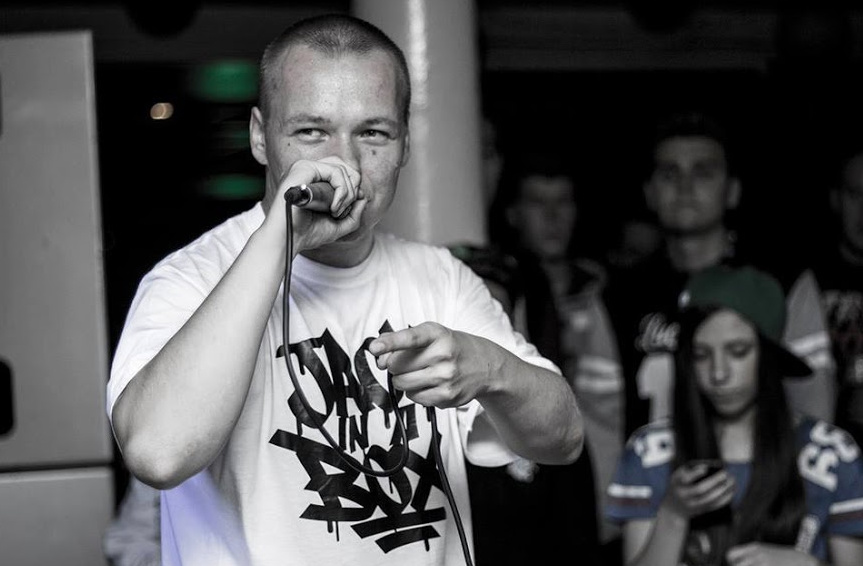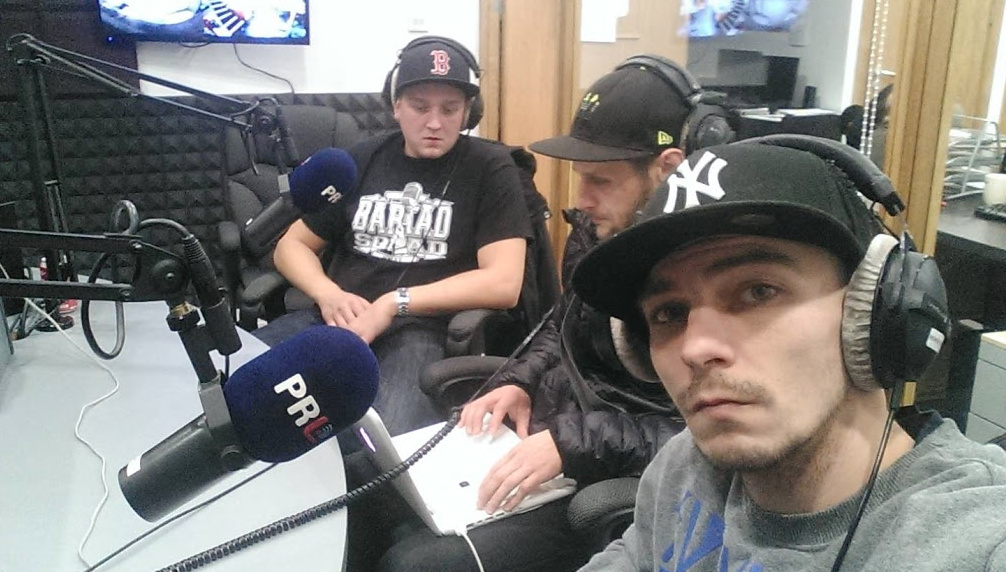This article originally appeared on Noisey UK.
As a Polish immigrant coming to Britain in the 90s at the age of ten, I was quick to lose my Polish identity, avoid speaking in my mother tongue in public, or even pronounce my name in the Polish way. When it comes to immigration in Britain, some cultures assimilate more than others.
Videos by VICE
It was an inferiority complex thing—when most of your family carried with them pained stories about living behind the Iron Curtain, longing for the kind of consumer goods and ‘progressive’ culture the West had to offer, then when you arrive in that very same West, it’s kinda easy to let your Polish pride be overpowered by everything around you, letting British culture somewhat define you.
A lot has changed since I first arrived in the 90s though, and Poland has been Westernised to the point that the Communist ‘milk bar’ has become the subject of hipster nostalgia in Warsaw, Kraków, and Łódź. There is a pride about Polish culture again, not just at home but in British Polish communities, and nowhere is this more audibly evident than at UK Polish hip-hop events, where rappers come out to spit bars for the near million Polish immigrants now living here.
The question of assimilation is always pertinent for migrants, but especially interesting in the context of a new wave of Polish rappers and MCs, living and making music on British soil. I first encountered them as support acts whenever big Polish hip-hop heavyweight acts such as Slums Attack, Paluch, JWP, and Kaczor would tour the UK, playing in places like London and Manchester. But the more events I attended, the more I realized that these smaller British-based Polish rappers were starting a whole scene of their own, rapping in both Polish and English, switching between styles, collaborating with British musicians, and selling out shows around the country.

Hedo Jackinabox by Grzegorz Rusin
Hedo Jackinabox is a rapper hailing from Chorzów near Katowice, who arrived when Britain granted free movement to new EU member states, just over ten years ago. Starting his forays into music by creating beats on Fruity Loops, he soon became influenced by grime because, “All the local MCs were spitting it.” Now working with producers such as Demondubz and Flash G, he raps in English with such ease you wouldn’t distinguish his accent from a genuine UK MC. “I’m no patriot,” he tells me when I ask him if he approaches any socio-political issues affecting immigrant Poles in his music. He’s making grime music with British producers, even if, paradoxically, his fans are mostly Polish.
That Polish rappers settling in the UK are inspired by grime makes sense when the context of production value is taken into consideration. Grime, like hip-hop before it, is usually in the habit of making music as cheaply as possible for maximum profit, grafting together bedroom beats on home computers that are custom made to be spat over. It’s no surprise that young kids from Poland—where the Communist state-sponsored music programs leaned towards traditional genres such as classical, ballet, opera and folk—were seduced by the idea of an accessible DIY approach to music, that didn’t necessarily fuck with particular denotations of class status or education.
Interesting however, is the way in which these Polish MCs residing in the UK are interacting with the genre. Perhaps, because of Poland’s history of its territory being overtaken by other countries, or their immigrant status, they are sensitive about cultural appropriation. In 2012, a Polish rapper living in London called HudyHary released a send for Polish hip-hop household name Pezet, calling him out for labelling his Polish hip-hop sound as grime. HudyHary had been, “researching and trying to catch the vibe for years, so I just couldn’t let him get away with calling it that”—his diss track sampled Wiley’s “Morgue.”
HudyHary calls his own music Polish grime, saying that it has earned its name by being “largely influenced by the old school UK grime sound.” He adds that, “When I got sucked into this thing, I didn’t know any other Polish MCs that were doing it, but soon found a few on YouTube such as MCs Powietrzny, Wuzet, FS Dan and Miszigen, and producers like Dirty Buttons and The Glitsch.”
But Polish, characterised by long words and harsh sounds, is harder to rap in than English, especially at 140bpm. So, as HudyHary says, it’s grime’s ethos which has had the biggest influence on the Polish version. “It’s the competitiveness, showing your skills as an MC, showing charisma on the mic—that’s important.” So as rappers such as Yarkee, HudyHary and Hedo Jackinabox warm up for the Polish hip-hop stars, they brag, rile and clash with each other in stage in ways that hark heavily to a UK grime set.
Not surprisingly, audiences react most positively in London, according to HudyHary, though he says by the end of a set he’s usually got the whole room vibing wherever he is. With typical venues 150-200 capacity the live events are intimate affairs, but when I ask what the MCs hope for the future, they express ambition to host Eskimo Dance style raves. However, quite humbly, they predict it will take the scene a good decade to mature to that sort of level.
Their conservative estimate makes sense when we take into consideration that there’s only been a smattering of collaborations between Polish stars and well-known British grime musicians. Popek, one of the best known Polish rappers in Britain, has worked with the likes of Wiley, JME, Krept and Konan, and Big Narstie, but he is an exception to the rule. The music these rappers are making might be packing venues, but it isn’t quite transferring into streams or sales, seen more as a live experience than a Soundcloud fave.
Similar events are gathering pace though. In Mancheter, Polish rapper and clothes designer, Michał ‘Yarkee’ Jarosz has co-founded an online radio station and club night, Free City, booking Manchester’s top bass music talent as he goes. He says he aims “to bring Polish people closer to English culture,” after feeling saddened by how some “separate themselves from other communities.” His fashion label, Save The Vinyl, is worn by local stars like Jonny Dub, Levelz and Madam X.
But there is also still a big disconnect between the tastes of this new wave of MCs and producers, compared to what Polish audiences are accustomed to in the UK. Both Hedo Jackinabox and HudyHary express distaste for rapping about being Polish specifically, focusing more on universal everyday struggles. For HudyHary. it comes down to the fact that he has no plans to go back to his motherland. “Here I feel like a human, not an immigrant,” he says.
But this outlook is a stark contrast to the many Poles who come over to Britain predominantly to work, keeping their families and identity rooted firmly back home. For these people, the traditional Polish hip-hop groups are the ones they still care about, not the Polish inflected grime. Gigs where they can chant along to protest lyrics such as Mr Zoob’s defiant “Mój Jest Ten Kawałek Podłogi” (“This is My Bit of the Floor”), as covered by seasoned Polish hip-hop outfit Pokakontaz to raucous moshing from their fans. Advertised in Polish only, these events, such as those organised by X-Side Music, guarantee a safe haven for Poles where they can be amongst their own and freely express feelings of anger at exploitation and xenophobia, something they might avoid elsewhere for fear of retaliation.

HudyHary and co
Still, at certain shows, this melting pot of old and new attitudes, of resistance and assimilation, is forced to blend, and it is what makes Polish hip-hop events so exhilarating to watch at the moment. Not just for Poles, but for British people too, such as the venue staff observing from the sides, or locals who went on a whim, who suddenly recognise Wiley’s “Eskimo Riddim” piercing through the Polish chants.
They might not realize it, but they’re the few Brits who are experiencing the birth of a new Polish-British sound, one which is battling for its location in British society right now, but that’s ever-developing position is creating a perfect breeding ground for thought-provoking content, be it addressing issues of identity or birthing unlikely collaborations. Whether the marriage of Polish hip-hop and grime will flourish into a lasting genre is yet to be seen, but the foundations are being laid by some very hard working, passionate and technically dexterous MCs—the best of Polish identity, personified.
You can find Kamila on Twitter.




